英语:高中英语构词法讲解
- 格式:doc
- 大小:112.50 KB
- 文档页数:9
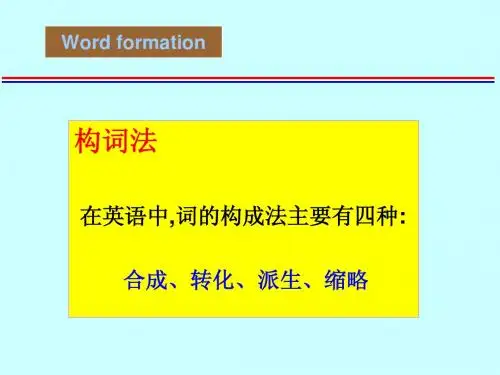
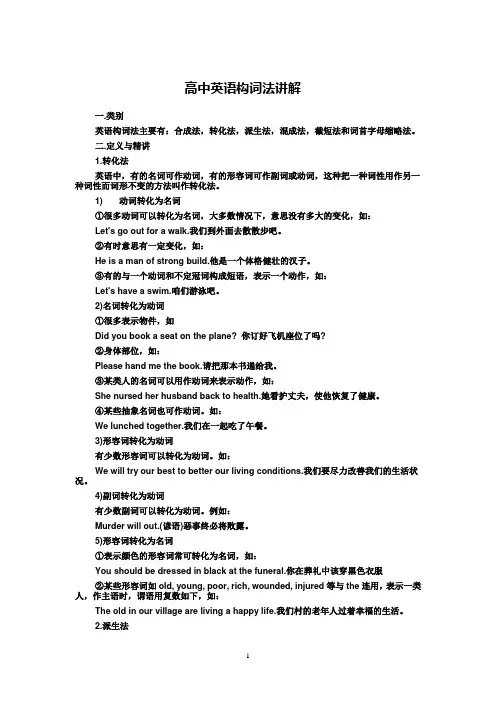
高中英语构词法讲解一.类别英语构词法主要有:合成法,转化法,派生法,混成法,截短法和词首字母缩略法。
二.定义与精讲1.转化法英语中,有的名词可作动词,有的形容词可作副词或动词,这种把一种词性用作另一种词性而词形不变的方法叫作转化法。
1) 动词转化为名词①很多动词可以转化为名词,大多数情况下,意思没有多大的变化,如:Let's go out for a walk.我们到外面去散散步吧。
②有时意思有一定变化,如:He is a man of strong build.他是一个体格健壮的汉子。
③有的与一个动词和不定冠词构成短语,表示一个动作,如:Let's have a swim.咱们游泳吧。
2)名词转化为动词①很多表示物件,如Did you book a seat on the plane? 你订好飞机座位了吗?②身体部位,如:Please hand me the book.请把那本书递给我。
③某类人的名词可以用作动词来表示动作,如:She nursed her husband back to health.她看护丈夫,使他恢复了健康。
④某些抽象名词也可作动词。
如:We lunched together.我们在一起吃了午餐。
3)形容词转化为动词有少数形容词可以转化为动词。
如:We will try our best to better our living conditions.我们要尽力改善我们的生活状况。
4)副词转化为动词有少数副词可以转化为动词。
例如:Murder will out.(谚语)恶事终必将败露。
5)形容词转化为名词①表示颜色的形容词常可转化为名词,如:You should be dressed in black at the funeral.你在葬礼中该穿黑色衣服②某些形容词如old, young, poor, rich, wounded, injured等与the连用,表示一类人,作主语时,谓语用复数如下,如:The old in our village are living a happy life.我们村的老年人过着幸福的生活。
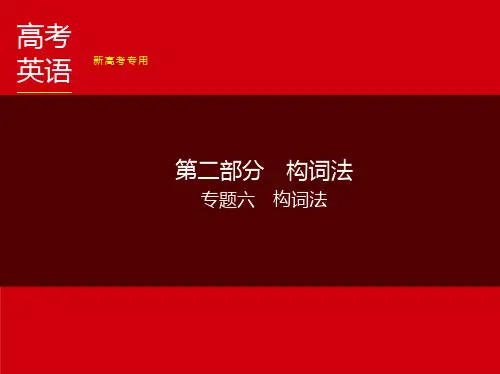
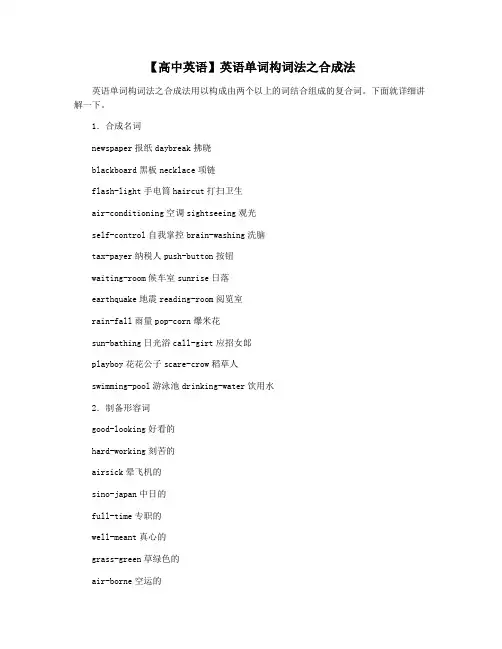
【高中英语】英语单词构词法之合成法英语单词构词法之合成法用以构成由两个以上的词结合组成的复合词。
下面就详细讲解一下。
1.合成名词newspaper报纸daybreak拂晓blackboard黑板necklace项链flash-light手电筒haircut打扫卫生air-conditioning空调sightseeing观光self-control自我掌控brain-washing洗脑tax-payer纳税人push-button按钮waiting-room候车室sunrise日落earthquake地震reading-room阅览室rain-fall雨量pop-corn爆米花sun-bathing日光浴call-girt应招女郎playboy花花公子scare-crow稻草人swimming-pool游泳池drinking-water饮用水2.制备形容词good-looking好看的hard-working刻苦的airsick晕飞机的sino-japan中日的full-time专职的well-meant真心的grass-green草绿色的air-borne空运的hand-made手工做的ocean-going远洋的home-sick想家的cold-blooded无情的man-eating吃人的waterproof防尘的fresh-baked新烤的heartbreaking并使人心痛的 3.合成动词half-close半关broadcast播送half?hibernate半休眠whitewash粉刷4.制备副词whenever无论somewhere某处however然而wherever无论何处5.合成代词myself我自己nobody没有人6.其他合成词four-year-old四岁的face-to-face面对面的up-and-down上上下下的three-in-one三合一的。
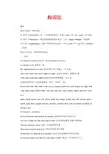
构词法一、概说英语主要有三种构词法:1)转化(Conversion):由一个词类转化为另一词类:water(名)水-- water(动)浇水2)派生(Derivation):通过加前缀或后缀构成另一个词:happy--unhappy(加前缀)3)合成(Compounding):由两个或更多的词合成一个词:wood(木)+cut(刻)--woodcut (木刻)除此之外还有一些次要的构词法。
二、转化有大量动词可以转化为名词,有时意思没有太大变化:Let me have a try. 我来试一试。
We stopped there for a swim. 我们在那儿停下来游了一会儿泳。
This is for winter wear. Don’t make it to tight. 这是冬天穿的,别做的太紧。
I like a quiet read after supper. 晚饭后我喜欢静静地看一会儿书。
这类名词常可和一动词构成短语,表示一个动作,如:have a look (chat, talk, wash, swim, rest, try, quarrel, smoke, lie, read, dream, run, fight, walk , ride, drink, laugh, dance, bathe, wish, win, fear, love, shave, debate, dipute, interview, taste, etc.)make a study (guess, visit, call, survey, jump, slip, change, search, stay, start, answer, reply, r emark, fight, arrest, appeal, purchase, sacrifice, demand, show, deal, an attempt, an attack, an advance, etc.)有时意思有一定的变化:He was about the same build as his brother. 他的体形和他哥哥差不多。
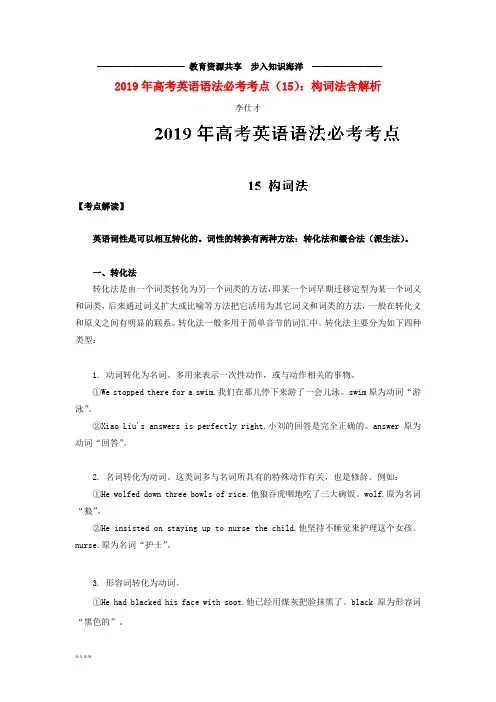
——————————教育资源共享步入知识海洋————————2019年高考英语语法必考考点(15):构词法含解析李仕才【考点解读】英语词性是可以相互转化的。
词性的转换有两种方法:转化法和缀合法(派生法)。
一、转化法转化法是由一个词类转化为另一个词类的方法,即某一个词早期迁移定型为某一个词义和词类,后来通过词义扩大或比喻等方法把它活用为其它词义和词类的方法,一般在转化义和原义之间有明显的联系。
转化法一般多用于简单音节的词汇中。
转化法主要分为如下四种类型:1. 动词转化为名词。
多用来表示一次性动作,或与动作相关的事物。
①We stopped there for a swim.我们在那儿停下来游了一会儿泳。
swim原为动词“游泳”。
②Xiao Liu's answers is perfectly right.小刘的回答是完全正确的。
answer原为动词“回答”。
2. 名词转化为动词。
这类词多与名词所具有的特殊动作有关,也是修辞。
例如:①He wolfed down three bowls of rice.他狼吞虎咽地吃了三大碗饭。
wolf.原为名词“狼”。
②He insisted on staying up to nurse the child.他坚持不睡觉来护理这个女孩。
nurse.原为名词“护士”。
3. 形容词转化为动词。
①He had blacked his face with soot.他已经用煤灰把脸抹黑了。
black 原为形容词“黑色的”。
②My father is emptying a box of rubbish into a rubbish-cart.我爸爸正将垃圾倒入垃圾车。
empty原为形容词“空的”。
4. 形容词转化为名词。
即用性质来指代这种性质的事物。
例如:①My mother likes red.我妈妈喜欢红色(的)。
red原为形容词“红色的”。
②The Chinese are working-hard and brave people.中国人勤劳而勇敢。
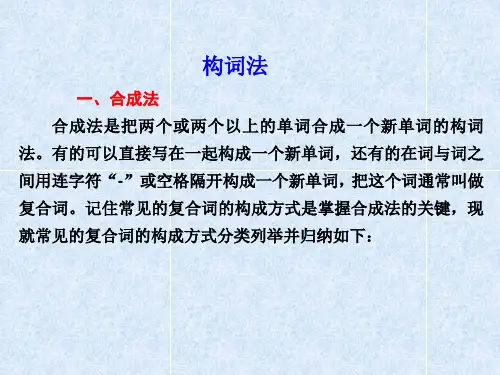
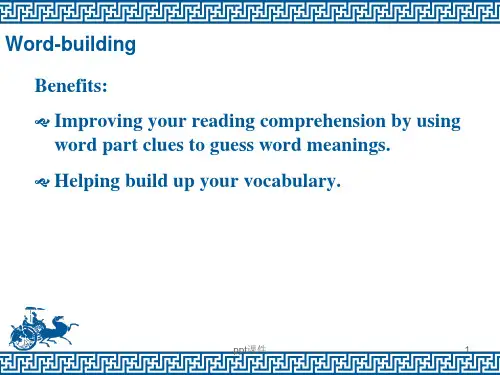

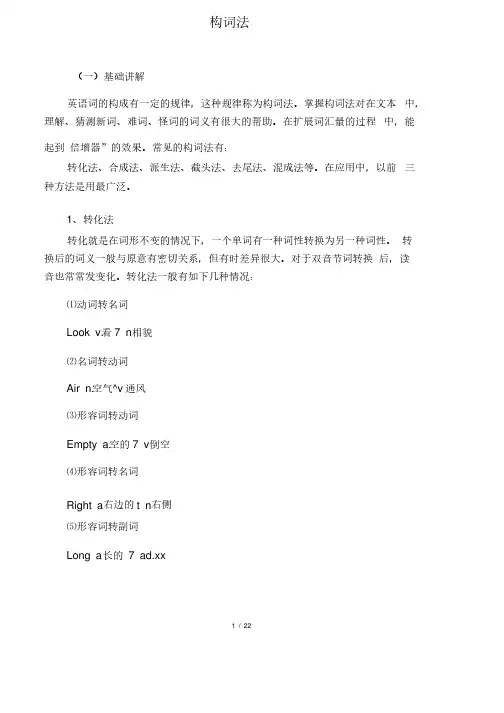
构词法(一)基础讲解英语词的构成有一定的规律,这种规律称为构词法。
掌握构词法对在文本中,理解、猜测新词、难词、怪词的词义有很大的帮助。
在扩展词汇量的过程中,能起到倍增器”的效果。
常见的构词法有:转化法、合成法、派生法、截头法、去尾法、混成法等。
在应用中,以前三种方法是用最广泛。
1、转化法转化就是在词形不变的情况下,一个单词有一种词性转换为另一种词性。
转换后的词义一般与原意有密切关系,但有时差异很大。
对于双音节词转换后,读音也常常发变化。
转化法一般有如下几种情况:⑴动词转名词Look v.看7 n相貌⑵名词转动词Air n.空气空气^v通风⑶形容词转动词Empty a.空的空的7 v倒空⑷形容词转名词Right a右边的t n右侧⑸形容词转副词Long a 长的长的7 ad.xx1 / 22、合成法就是将两个或两个以上的词合成的一个新词。
合成词各个成分之 间有的要用连字2、合成法就是将两个或两个以上的词合成的一个新词。
合成词各个成分之符连接,有的直接连在一起。
符连接,有的直接连在一起。
、派生法是在一个词根的前面或后面加上某个词缀来产生新词。
加在前 面的叫前缀,加3、派生法是在一个词根的前面或后面加上某个词缀来产生新词。
加在前在后面的词缀叫做后缀。
在后面的词缀叫做后缀。
前缀多引起词义的变化而不改变词性。
后缀对词性、词义都可能有影响。
前缀多引起词义的变化而不改变词性。
后缀对词性、词义都可能有影响。
例如:例如:前缀词根后缀dis agree ment (不同意n .)前缀词根后缀、截短法(缩略法)截短法,即将单词缩写,词义和词性保持不变,主要有 截头、去尾、4、截短法(缩略法)截短法,即将单词缩写,词义和词性保持不变,主要有截头去尾等形式。
截头去尾等形式。
⑴截头 telephone t phone aeroplane t plane⑴截头omnibus bus⑵去尾⑵去尾mathematics t mathsco-operate c o pexamination examkilogram kilolaboratory labtaxicab taxi⑶截头去尾⑶截头去尾influenza flurefrigerator fridgeprescription script5、混合法(混成法)、混合法(混成法)混合法,即将两个词混合或各取一部分紧缩而成一个新词。
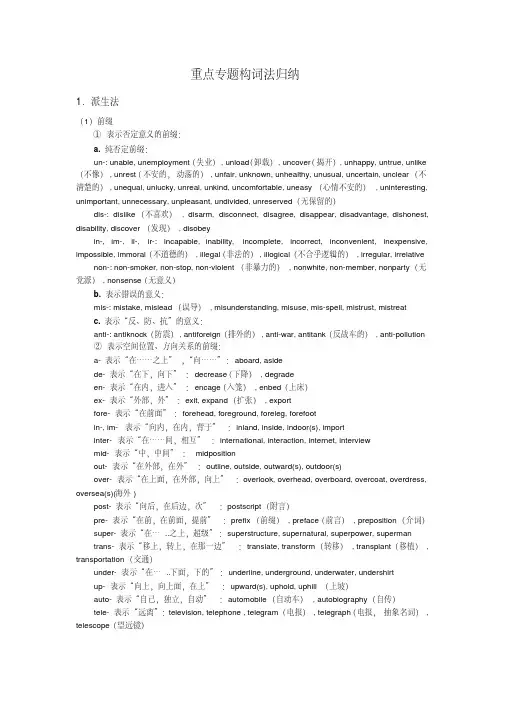
重点专题构词法归纳1.派生法(1)前缀①表示否定意义的前缀:a. 纯否定前缀:un-: unable, unemployment(失业), unload(卸载), uncover(揭开), unhappy, untrue, unlike (不像), unrest(不安的,动荡的), unfair, unknown, unhealthy, unusual, uncertain, unclear(不清楚的), unequal, unlucky, unreal, unkind, uncomfortable, uneasy(心情不安的), uninteresting, unimportant, unnecessary, unpleasant, undivided, unreserved(无保留的)dis-: dislike(不喜欢), disarm, disconnect, disagree, disappear, disadvantage, dishonest, disability, discover(发现), disobeyin-, im-, il-, ir-: incapable, inability, incomplete, incorrect, inconvenient, inexpensive, impossible, immoral(不道德的), illegal(非法的), illogical(不合乎逻辑的), irregular, irrelative non-: non-smoker, non-stop, non-violent(非暴力的), nonwhite, non-member, nonparty(无党派), nonsense(无意义)b. 表示错误的意义:mis-: mistake, mislead(误导), misunderstanding, misuse, mis-spell, mistrust, mistreatc. 表示“反、防、抗”的意义:anti-: antiknock(防震), antiforeign(排外的), anti-war, antitank(反战车的), anti-pollution②表示空间位置、方向关系的前缀:a- 表示“在……之上”,“向……”:aboard, asidede- 表示“在下,向下”:decrease(下降), degradeen- 表示“在内,进入”:encage(入笼), enbed(上床)ex- 表示“外部,外”:exit, expand(扩张), exportfore- 表示“在前面”:forehead, foreground, foreleg, forefootin-, im- 表示“向内,在内,背于”:inland, inside, indoor(s), importinter- 表示“在……间,相互”:international, interaction, internet, interviewmid- 表示“中,中间”:midpositionout- 表示“在外部,在外”:outline, outside, outward(s), outdoor(s)over- 表示“在上面,在外部,向上”:overlook, overhead, overboard, overcoat, overdress, oversea(s)(海外)post- 表示“向后,在后边,次”:postscript(附言)pre- 表示“在前,在前面,提前”:prefix(前缀), preface(前言), preposition(介词)super- 表示“在…..之上,超级”:superstructure, supernatural, superpower, superman trans- 表示“移上,转上,在那一边”:translate, transform(转移), transplant(移植), transportation(交通)under- 表示“在…..下面,下的”:underline, underground, underwater, undershirtup- 表示“向上,向上面,在上”:upward(s), uphold, uphill(上坡)auto- 表示“自己,独立,自动”:automobile(自动车), autobiography(自传)tele- 表示“远离”:television, telephone , telegram(电报), telegraph(电报,抽象名词), telescope(望远镜)③表示时间,序列关系的前缀:fore- 表示“在前面,先前,前面”:foreword(前言), forecast(预报), foretell(预言), foresee(预见), foreknow(先知), foreknowledge(先知)mid- 表示“中,中间”:midnight, midsummer, mid-day, mid-autumnpost- 表示“在后,后”:postwar, postgraduate(研究生), postdatepre- 表示“在前,事先,预先”:preheat, prewar, prehistory(史前), preview(预习), prebattle, prepayre- 表示“再一次,重新”:retell(复述), rewrite, renew(续借), reconsider, reuse, remarry, recycle(回收利用), rebuild④表示比较程度差别关系的前缀:by- 表示“副,次要的”:byproduct(副产品), bywork(副业)extra- 表示“超越,额外”:extraordinaryover- 表示“超过,过度,太”:overeat(吃过多), oversleep(睡过头), overpraise(过奖), overwork, overact(行为过分), overdounder- 表示“低劣,低下”:undersize, undergrown, underproduction(生产不足)vice- 表示“副,次”:vice-president, vice -chairman⑤表示共同,相等意思的前缀:co- 表示“共同,一起”:coexist(共同生存), co-operate, co-worker, coactions(合作行动), coauthor(合作作者)⑥表示某种状态,构成形容词、副词或动词:a- afraid, alive, alone, asleep, ashamed, aloud, ahead, aside, alike, awake⑦表示分离,离开意思的前缀:a- 表示“分离,离开”:away, apartde- 表示“离去,处去”:depart, decolour⑧表示“自我”:self- self-protect(ion), self-made, self-knowledge⑨表示变换词类作用的前缀:be- befrienden- enslave, enable, enrich, enlarge, encourage⑩表示数量关系的前缀:a. 表示“单一”,“一”:uni- uniform(统一服装), unicellular(单细胞)b. 表示“二,两,双”:bi- bicycletwi- twilightc. 表示“半,一半”:semi- semiconductor(半导体), semicircle(半圆), semimonthly(半月刊), semifinal (半决赛)d. 表示“百,百分之一”:centi- centimetere. 表示“千,千分之一”:kilo- kilometer, kilogram, kilowattf. 表示“微小”:micro- microvolt(微伏特), microcomputer(微机), microscope(显微镜)g. 表示“许多,复,多数”:multi- multimedia(多媒体), multicolored, multiform, multinaturalh. 表示“千分之一、毫”:milli- millimeter, milligrami. 表示“微小、微型”:mini- minibus, miniskirt, minipark(2)后缀①名词后缀:a. 具有某种职业或动作的人:-an, -ian, -ician 表示“……地方的人,精通……的人”:American, Asian, Australian, Russian, Italian , historian, librarian, electrician, magician(魔术师), technician, musician, politician(政客), physician(内科医生),-ant,-ent 表示“……人”:merchant, servant, assistant, agent, student,-ee 表示“动作承受者”:employee(雇员), examinee, payee(收款人), interviewee -eer 表示“从事于……人”:engineer, volunteer(志愿者)-er 表示“从事某种职业的人, 某地区,地方的人”:banker, observer, Londoner, villager singer, driver, writer, speaker, traveller, buyer-or 表示“……者”:author, doctor, operator, actor, visitor, inventor, educator-ar, -ary 表示“……的人, 从事……的人”:scholar, liar, beggar, secretary, missionary -ese 表示“……国人,……地方的人”:Chinese, Japanese, Cantonese(广东人)-ess 表示“阴性人称名词”:actress(女演员), hostess(女主人), manageress(女经理)-ist 表示“从事……研究者,信仰……主义者”:pianist, communist, dentist, artist, chemist, socialist, typist, receptionist-icist 表示“……家,……者, ……能手”:physicist, phoneticist(语音学家), technicist -logist 表示“……学家,研究者”:biologist, geologist(地质学家)b. 构成具有抽象名词的含义:-age 表示“状态,行为,身份及其结果,总称”:courage, storage, marriage, percentage -al 表示“事物的动作,过程”:refusal, arrival, survival, denial, approval, trial, burial-ance, -ence 表示“性质,状况,行为,过程,总量,程度”:importance, distance, avoidance, appearance, performance, diligence, difference, obedience, absence, presence(出席), existence -ancy, -ency 表示“性质,状态,行为,过程”:frequency(频繁), urgency(紧急), efficiency (高效率),-ity 表示“性质,状态,程度”:purity, reality, equality-bility 表示“动作,性质,状态”:ability, possibility, probability, responsibility-dom 表示“等级,领域,状态”:freedom, kingdom, wisdom-ery, -ry 表示“行为,状态,习性,性质”:bravery, slavery-hood 表示“资格,身份, 年纪,状态”:childhood, girlhood, boyhood, manhood-ice 表示“行为,性质,状态”:notice, justice, service-ing 表示“动作的过程,结果”:building, writing, learning-ion, -ation, -ition, -sion 表示“行为的过程,结果,状况”:suggestion, action, solution, invention, direction, correction, collection, instruction, destruction, introduction, congratulation, dictation, invitation, pronunciation, examination, graduation, operation, education, information, translation, starvation, satisfaction, relation, irrigation, determination, preparation, imagination, explanation, opposition, competition, description, decision, division, conclusion, explosion,impression, expression, admission, permission, discussion-ment 表示“行为,状态,过程,手段及其结果”:disappointment, treatment, movement, judgment, punishment, argument, agreement, government, development, improvement, requirement, astonishment, encouragement-ness 表示“性质,状态,程度”:goodness, kindness, tiredness, friendliness, business, illness, happiness, goodness, willingness, weakness, fairness-ism 表示“制度,主义,学说,信仰,行为”:socialism, criticism, heroism, tourism, communism(共产主义), Marxism(马克思主义)-ship 表示“情况,性质,技巧,技能及身份,职业”:hardship, relationship, membership, friendship, seamanship, ownership, scholarship, professorship-th, 表示“动作,性质,过程,状态”:strength, length, width, depth, wealth, truth, growth, warmth, youth-ure 表示“行为,结果”:exposure(暴露), pressure, failure, procedure(手续), mixture -craft 表示“工艺”:aircraft, needlecraft, woodcraftc. 带有场所,地方的含义:-age 表示“住所,地点”:village, cottage-ary 表示“住所,场地”:library, granary (谷仓)-ory 表示“工作场所,住处”:factory, dormitory, laboratory, observatory②形容词后缀:a. 带有“属性,倾向,相关”的含义:-able, -ible: movable, comfortable, eatable, enjoyable, acceptable, reasonable, applicable, visible, responsible, terrible, horrible-al: natural, additional, educational, national-ant, -ent: distant, important, excellent-ing(表示特征:令人觉得): moving, touching, daring, interesting, exciting, disappointing , astonishing, boring, amazing-ed(表示情绪:觉得): pleased, interested, surprised, worried, excited, bored, determined, delighted-ish: foolish, bookish, selfish-ive: active, impressive, decisive, active, instructive, expensive, progressiveb. 表示“相象,类似”的含义:-ish: boyish, childish-like: manlike, childlike-some: troublesome, handsome-y: milky, cloudy sunny, windy, rainy, foggy, healthy, wealthy, worthy, bloody, funny, dirty, lucky, noisy, salty, smelly, hilly-ly: manly, fatherly, motherly, sisterly, brotherly, daily, weekly, monthly, quarterly, yearly, friendly, lonely, orderly, lovely, lively, likely, scholarlyc. 表示“充分的”含义:-ful: beautiful, wonderful, helpful, truthful, successful, harmful, useful, careful, forgetful, merciful-ous: dangerous, courageous, nervous, mountainous, humorous, variousd. 表示由某种物质形成,制成或生产的含义:-en: wooden, golden, woolene. 表示方向的含义:-ern: eastern, western, southern, northern, southeastern, northwestern-ward: downward, forwardf. 表示“数量关系”的含义:-teen: thirteen-ty: fifty-th: fourth, fiftiethg. 表示国籍,语种,宗教的含义:-an: Roman, European-ese: Chinese, Japanese-ish: English, Spanishh. 表示否定:-less: countless, stainless(不锈的), wireless, useless, endless, priceless(无价的,贵重的), hopeless③动词后缀:-ize, ise 表示“做成,变成,……化”:modernize(现代化), democratize(民主化), organize, apologize, realize-en 表示“使成为,引起,使有”:quicken, weaken, soften, harden-fy 表示“使……化, 使成”:beautify, purify(净化), intensify, signify, simplify(简化), satisfy④副词后缀:-ly: possibly, swiftly, simply-ward(s): downward, inwards, upward-ways: always, sideways-wise: otherwise, clockwise注意:有的单词有双重后缀,如:use(用途)→useless(无用的)→uselessness(无用)self(自己)→selfish(自私的)→selfishness(自私)有的单词则是前后缀同时使用,如:important→importance→unimportanceregular(有规律的,有规则的)→irregular(无规律的,不规则的)→irregularity(无规律,不规则)2.合成法(1)合成名词boyfriend, girlfriend, bus-driver, necklace, playground, radioactive, headmaster, sunshine, notebook, armchair, wheelchair, postcard, football, spaceship, blackboard, firefighter, fireman, gateman, chairman, weatherman, businessman, armyman, postman, sportsman, bedroom, reading-room, classroom, newspaper, pickpocket(扒手), she-goat(雌性山羊), editor-in-chief (主编), daybreak(破晓), handshake(握手), silkworm(蚕), outbreak(爆发)(2)合成形容词名词+动词过去分词:man-made, homemade副词+动词过去分词:well-known, newly-built(新建的)形容词+名词ed:kind-hearted, cold-blooded数词+名词ed:five-storeyed(五层楼的), four-legged(四条腿的)名词+动词现在分词:English-speaking, Chinese-speaking, brainwashing(洗脑的)由三个词构成的合成形容词:face-to-face, heart-to-heart, two-year-old, eight-metre-long 其他合成形容词:everyday(日常的), faraway(遥远的), snow-white(雪白的), lay-off (下岗的)3.转化法(1)名词→动词hand(手→传递)back(背部,后面→支持,后退)charge(费用→收费)copy(抄本,复印件→抄写,复印)flood(洪水→淹没)heat(热量→加热)paint(油漆→刷漆)phone(电话→打电话)pin(别针→装订)waste(废物→浪费)face(脸→面对)use(用途→使用)interest(兴趣→使兴趣)surprise(惊讶→使惊讶)taste(味道→品尝)smell(气味→闻)break(短暂休息→折断)present(礼物→赠送)(2)形容词→动词clean(干净→使干净,打扫)clear(清楚→清理)dirty(脏→弄脏)dry(干燥→烘干,晒干)empty(空的→倒空)free(自由→使自由,释放)slow(慢的→放慢)warm(暖和→使暖和)cool(凉的→冷却)quiet(安静→使安静)。
英语构词方法主要有三种:即合成法、派生法和转化法。
1、合成法将两个或两个以上的单词合成在一起而构成的新词,叫做合成词。
(1)合成形容词①名词+现在分词例:English-speaking 讲英语的,south-facing 朝南的②名词+过去分词例:man-made 人造的,water-covered 被水覆盖的③名词+形容词例:snow-white 雪白的,day-long 整天的④形容词+名词+-ed 例:warm-hearted 热情的,kind-hearted 好心肠的⑤形容词/副词+现在分词例:good-looking 好看的 funny-looking 滑稽的⑥副词+过去分词例:well-known 出名的,deep-set(眼睛)深陷的⑦副词/形容词+名词例:right-hand 右手的,full-time 专职的⑧数词+名词例:100-meter 100米的,million-pound 百万英镑的⑨数词+名词+形容词例:180-foot-high 180英寸高的,10-year-old 10岁的⑩数词+名词+-ed 例:four-footed/legged 四脚的,one-eyed 独眼龙的(2)合成名词①名词+名词例:weekend 周末,classroom 教室,bookshop 书店②形容词/介词+名词例:gentleman 绅士,loudspeaker 扬声器③动词+名词例:typewriter 打字机,cookbook 烹调书④名词+动词例:daybreak 破晓,toothpick 牙签⑤动词-ing形式+名词例:reading-room 阅览室,sleeping-car 卧车车厢⑥副词+动词例:outbreak 爆发,downpour 倾盆大雨⑦名词+动名词例:handwriting 笔迹,sun-bathing 日光浴⑧名词+in/to0+名词例:mother-in-law 岳母,brother-in-law 姐夫(3)合成动词①副词+动词例:overthrow 推翻,understand 理解②形容词+动词例:broadcast 广播,whitewash 粉刷③名词+动词例:typewrite 打字,sleepwalk 梦游(4)合成副词①介词+名词例:underfoot 脚下,beforehand 事先②形容词+名词例:hotfoot 匆忙地,someday 有朝一日③形容词+副词例:anywhere 任何地方,outwards 向外、(5)合成介词:within在……之内,without没有,inside在……里边,into进入(6)合成代词:myself我自己,ourselves我们自己,anyone任何人,nobody没有人nothing 没东西,somebody有人。
高中英语构词法总结构词法是语言学中的一个重要分支,研究的是词汇的形成和演变规律。
在高中英语学习中,掌握构词法对于理解和记忆单词的意义和用法有着重要的帮助。
在英语中,构词法主要有前缀、后缀、词根和派生等几种形式。
下面将对这几种构词法进行总结和讲解。
1. 前缀前缀是指加在词根前面的字母或字母组合,能改变词的词性或词义。
常见的前缀有:un-(不)、re-(再)、dis-(否定)、pre-(前)、mis-(错误)、over-(过度)等。
例如,unhappy(不快乐)、redo(重做)、dislike(不喜欢)、preheat(预热)、misunderstand(误解)、overweight(超重)等。
2. 后缀后缀是指加在词根后面的字母或字母组合,能改变词的词性或词义。
常见的后缀有:-ful(充满的)、-less(没有的)、-er(人或物的)、-ing(进行的)、-ed (过去式或完成式)、-able(能够的)、-ment(行为或状态)等。
例如,beautiful (美丽的)、careless(粗心的)、teacher(教师)、running(跑步的)、loved (被爱的)、comfortable(舒适的)、excitement(激动)等。
3. 词根词根是一个单词的核心部分,无法再分解或改变,是构成其他词的基础。
在英语中,许多词根来自于拉丁语和希腊语,如:bio-(生命)、tele-(远距离)、auto-(自动)、photo-(光)、chron-(时间)等。
通过了解和记忆常见的词根,可以更好地理解和记忆一些词汇的意义。
例如,biology(生物学)、television(电视)、automatic(自动的)、photograph(照片)、chronological(按时间顺序的)等。
4. 派生派生是指通过在词根、前缀或后缀上加上其他语素形成新的词。
派生可以改变词的词性、词义或词形。
常见的派生方式有名词化、动词化、形容词化等。
高中英语构词法讲解高中英语构词法讲解(一):转化法(conversion)在英语中,一个单词由一种词性转化为另一种或几种词性而词形不变的方法叫做转化法。
1. 动词转化为名词Let me have a try. 让我试试。
They are only allowed to sell soft drinks at school.在学校里只准许他们出售不含酒精的饮料。
2. 名词转化为动词He shouldered his way through the crowd.他用肩膀推开人群前进。
The smell from the kitchen made his mouth water.从厨房传来的气味使他流口水。
3. 形容词转化为动词We will try our best to better our living conditions.我们要尽力改善我们的生活状况。
They tried to perfect the working conditions.他们努力改善工作条件。
4. 形容词转化为名词He didnt know the difference between right and wrong.他不辨是非。
The old in our village are living a happy life.我们村的老年人过着幸福的生活。
5. 形容词转化为副词How long have you lived there?你在那儿住多久了?6. 个别词在一定场合中可转化为名词Warm clothes are a must in the mountains.穿暖和的衣服到山区去是必须的。
Life is full of ups and downs.人生有得意时也有失意时。
His argument contains too many ifs and buts.他的辩论中含有太多的如果和但是。
高中英语构词法讲解(二):合成法(composition)由两个或两个以上的单词连在一起合成一个新词,这种构词法叫做合成法,合成的词叫做合成词(compounds)。
高中英语构词法讲解与练习一.类别英语构词法主要有:合成法,转化法,派生法,混成法,截短法和词首字母缩略法。
二.定义与精讲1.转化法英语中,有的名词可作动词,有的形容词可作副词或动词,这种把一种词性用作另一种词性而词形不变的方法叫作转化法。
1)动词转化为名词①很多动词可以转化为名词,大多数情况下,意思没有多大的变化,如:Let's go out for a walk.我们到外面去散散步吧。
②有时意思有一定变化,如:He is a man of strong build.他是一个体格健壮的汉子。
③有的与一个动词和不定冠词构成短语,表示一个动作,如:Let's have a swim.咱们游泳吧。
2)名词转化为动词①很多表示物件,如Did you book a seat on the plane? 你订好飞机座位了吗?②身体部位,如:Please hand me the book.请把那本书递给我。
③某类人的名词可以用作动词来表示动作,如:She nursed her husband back to health.她看护丈夫,使他恢复了健康。
④某些抽象名词也可作动词。
如:We lunched together.我们在一起吃了午餐。
3)形容词转化为动词有少数形容词可以转化为动词。
如:We will try our best to better our living conditions.我们要尽力改善我们的生活状况。
4)副词转化为动词有少数副词可以转化为动词。
例如:Murder will out.(谚语)恶事终必将败露。
5)形容词转化为名词①表示颜色的形容词常可转化为名词,如:You should be dressed in black at the funeral.你在葬礼中该穿黑色衣服②某些形容词如old, young, poor, rich, wounded, injured等与the连用,表示一类人,作主语时,谓语用复数如下,如:The old in our village are living a happy life.我们村的老年人过着幸福的生活。
2.派生法在词根前面加前缀或在词根后面加后缀构成一个与原单词意义相近或截然相反的新词叫作派生法。
1)前缀除少数前缀外,前缀一般改变单词的意义,不改变词性;后缀一般改变词类,而不引起词义的变化。
(1)表示否定意义的前缀常用的有dis-, il-, im-, in-, ir-, mis-, non-, un-等,在单词的前面加这类前缀常构成与该词意义相反的新词。
例如:appear出现→disappear消失correct正确的→incorrect不正确的lead带领→mislead领错stop停下→non-stop不停(2)表示其他意义的前缀常用的有a-(多构成表语形容词), anti- (反对;抵抗), auto- (自动), co- (共同), en- (使), inter- (互相), re- (再;又), sub- (下面的;次;小), tele- (强调距离)等。
例如:alone单独的antigas防毒气的autochart自动图表cooperate合作enjoy使高兴internet互联网reuse再用subway地铁telephone电话2)后缀英语单词不仅可以通过加前缀构成新词,也可加后缀构成新词。
后缀通常会改变单词的词性,构成意义相近的其他词性;少数后缀还会改变词义,变为与原来词义相反的新词。
(1)构成名词的后缀常用的有-ence,-(e)r/ -or (从事某事的人),-ese (某地人),-ess (雌性),-ful (一……),-ian (精通……的人),-ist (专业人员),-ment (性质;状态),-ness (性质;状态),-tion(动作;过程)等。
例如:differ不同于→difference区别write写→writer作家Japan日本→Japanese日本人act表演→actress女演员mouth口→mouthful一口music音乐→musician音乐家(2)构成动词的后缀常用的有-(e)n (多用于形容词之后),-fy (使……化),-ize (使……成为)。
例如:wide→widen加宽beauty→beautify美化pure→purify提纯real→realize意识到organ→organize组织(3)构成形容词的后缀常用的有-al,-able (有能力的),-(a)n(某国人的),-en (多用于表示材料的名词后),-ern (方向的),-ese(某国人的),-ful,-(ic)al,-ish,-ive,-less (表示否定),-like (像……的),-ly,-ous,-some,-y (表示天气)等。
例如:nature自然→natural自然的reason道理→reasonable有道理的America美国→American美国的China中国→Chinese中国人的gold金子→golden金的east东→eastern东方的child孩子→childish孩子气的snow雪→snowy雪的(4)构成副词的常用后缀有-ly (主要用于形容词之后表示方式或程度),-ward(s) (主要用于表示方位的词之后表示方向)。
例如:angry生气的→angrily生气地to到→towards朝……,向……east东方→eastward向东(5)构成数词的后缀有-teen (十几),-ty (几十),-th (构成序数词)。
例如:six六→sixteen十六→sixteenth第十六four四→forty四十→fortieth第四十3.合成法4.截短法(缩略法)截短法,即将单词缩写,词义和词性保持不变,主要有截头、去尾、截头去尾等形式。
1)截头telephone→phoneaeroplane→planeomnibus→bus2)去尾mathematics→mathsco-operate→co-opexamination→examkilogram→kilolaboratory→labtaxicab→taxi3)截头去尾influenza→flurefrigerator→fridgeprescription→script5.混合法(混成法)混合法,即将两个词混合或各取一部分紧缩而成一个新词。
后半部分表示主体;前半部分表示属性。
news broadcast→newscast新闻广播television broadcast→telecast电视播送smoke and fog→smog烟雾helicopter airport→heliport直升飞机场6.首尾字母缩略法首尾字母缩略法,即用单词首尾字母组成一个新词。
读音主要有两种形式,即各字母分别读音;作为一个单词读音。
very important person→VIP (读字母音)要人;大人物television→TV (读字母音)电视Testing of English as a Foreign Language→TOEFL托福三.巩固练习1. That man was ________enough not to tell the manager that he would not do the job.A. careB. carefulC. carelessD. carelessness2. The soldier died for saving the child,so his________ is heavier than Mount Tai.A. dieB. deadC. diedD. death3. The child looked ________at his brother who was badly wounded.A. sadlyB. sadnessC. sadelyD. sad4. He is an expert at chemistry. We all call him a ________.A. chemistryB. chemicalC. chemistD. physician5.The three- ________chair isn’t suitable for a young child. He may fall off.A. leggingB. leggedC. legsD. leged6. Stephenson became the________railway engineer in the world.A. leadB. leaderC. leadingD. leadership7.When the teacher praised him for working out the maths problem,Jack looked________about at his classmates.A. proudB. proudlyC. prideD. pridely8.To everyone’s ________,the girl finished the job quite well.A. satisfiedB. satisfactoryC. satisfyingD. satisfaction9.—What are you doing here?—Oh,my teacher asked me to write a passage about ________in English.—You can write________passage in English?A. 600 words;a 600-wordsB. 600-word;a 600-wordsC. 600 words;a 600-wordD. 600 words;a 600-words10. No one should enter the spot without the________of the police.A. permitB. permissionC. permittingD. permittence11. You must come with us to the police ________.Our head is waiting for you.A. headquartersB. headlineC. headmasterD. headache12.Letting that animal escape was no accident;you did it ________.A. intendB. intentionC. intentionallyD. intentional13. The shop owner welcomed all the guests with a________smile.A. practiceB. practiseC. practicalD. practiced14. The________ordered him to pay a $100 fine.A. judgerB. judgmentC. judgeD. judgement15. My TV is out of order. Can you tell me what is the________news about Iraq War?A. latelyB. latestC. laterD. latter16. The Great Wall is more than 6000 li in ________.A. longerB. lengthC. longD. longing17.To my ________,I passed the exam easily.A. joyB. joyfulC. joylessD. joyness18. Canada is mainly an________country.A. English-speakingB. speak-EnglishC. spoken-EnglishD. English-spoken19. How________ he is! He is always acting________.He is really a ________.A. foolish;foolishly;foolB. fool;foolish;foolC. foolish;fool;foolD. foolishly;foolish;fool20. The necklace that she lost is very expensive. It’s of great ________.A. valuableB. valueC. valuelessD. unvaluable21. There were________fish in the river in South America.A. in dangerB. dangerC. dangerousD. dangerless22.The letter “b”in the word “doubt”is________.A. soundB. silentC. silenceD. sounded23. The child looked at me________.A. strangerB. strangelyC. strangeD. strangeless24.The black people were against slavery and fought for their________bravely.A. freeB. freelyC. freedomD. frees25. What you said sounded________ but in fact it was untrue.A. reasonableB. reasonfulC. reasonlessD. unreason26. We have to learn ________technology from other countries.A. advanceB. advancingC. advantageD. advanced27. The children live in a village ________.They come here almost every day.A. nearbyB. nearC. nearlyD. near by28.Mr Black is an ________in the army,not an ________in the government. You can not easily find him in his________.A. official;officer;officeB. officer;office;officialC. official;official;officialD. officer;official;office29.You’d better give up smoking if you want to keep ________.A. healthB. healthyC. healthilyD. healthier30.________ speaking,I didn’t do it on purpose.A. HonestlyB. HonestC. HonestyD. Dishonest。